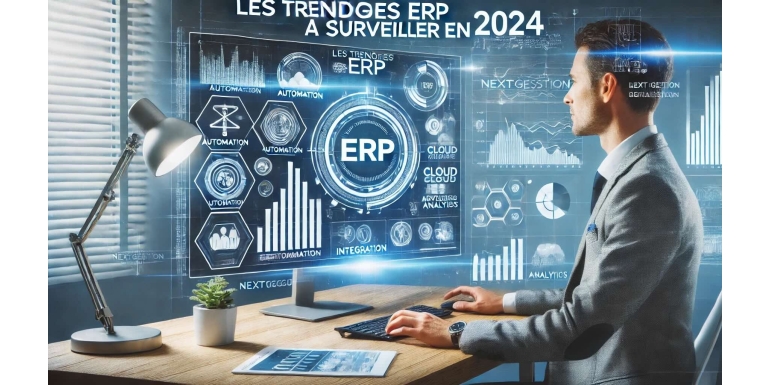
The world of Enterprise Resource Planning (ERP) systems is constantly evolving, and 2024 promises to be a pivotal year with new trends shaping how businesses utilize these systems to optimize their operations. This article will explore the key ERP trends to watch, ranging from artificial intelligence to the integration of cloud technologies, as well as enhanced user experience.
1. Artificial Intelligence and Automation
1.1 Expanded Intelligence
Artificial intelligence (AI) continues to transform the ERP landscape. In 2024, the focus will be on using AI to automate repetitive tasks and improve decision-making processes. ERP systems incorporating AI will analyze vast amounts of data to provide real-time recommendations, enabling businesses to react more swiftly to market changes.
1.2 Process Automation
Businesses are seeking solutions that efficiently automate business processes. ERP in 2024 will integrate advanced automation features, such as workflow automation, order management, and invoice processing, which will reduce human errors and increase operational efficiency.
2. Migration to the Cloud
2.1 Increased Cloud Adoption
The migration to cloud-based ERP solutions is a growing trend. In 2024, more businesses will adopt cloud ERP systems to benefit from the flexibility, scalability, and security they offer. The cloud also allows easy access to data, regardless of geographical location, which is essential in the hybrid work environment.
2.2 Multicloud and Hybrid Cloud
Businesses will begin to adopt multicloud and hybrid cloud strategies, combining multiple cloud services to meet their specific needs. This approach allows companies to distribute their data and applications across multiple cloud providers, enhancing resilience and security.
3. Enhanced User Experience
3.1 User-Friendly Interfaces
Next-generation ERPs will focus on improving user experience. In 2024, ERP systems will offer user-friendly interfaces similar to those of consumer applications. The goal is to reduce the learning curve for users and improve tool adoption.
3.2 Customization and Flexibility
ERP solutions will provide increased customization options, allowing businesses to tailor functionalities according to their specific needs. This flexibility is essential for meeting the diverse requirements of various sectors and business models.
4. Advanced Data Analytics
4.1 Integrated Business Intelligence
Integrating business intelligence (BI) capabilities into ERP systems will become indispensable in 2024. Businesses will need advanced analytics tools to interpret the data generated by ERP systems to make informed decisions. This includes interactive dashboards and real-time reporting.
4.2 Predictive Analytics
Predictive analytics capabilities powered by AI will enable businesses to forecast market trends and anticipate customer needs. This proactive approach will help them optimize inventory, plan resources, and enhance customer service.
5. Integration with Other Systems
5.1 APIs and Connectivity
Integrating ERP systems with other applications and tools will be essential in 2024. APIs (application programming interfaces) will play a crucial role in this integration, allowing businesses to easily connect their ERP with CRM tools, e-commerce platforms, and other specialized software.
5.2 Technological Ecosystems
Businesses will seek ERP solutions that are part of broader technological ecosystems. This will allow them to leverage synergies between different solutions and improve the overall efficiency of their operations.
6. Sustainability and Social Responsibility
6.1 Eco-Friendly ERPs
With growing attention on sustainability, companies will look for ERP systems that support environmentally friendly practices. In 2024, ERPs will incorporate features to measure and manage the environmental impact of operations, contributing to corporate social responsibility initiatives.
6.2 Corporate Social Responsibility (CSR)
Companies will also strive to use their ERPs to enhance their social responsibility. This includes tracking CSR initiatives and optimizing supply chains to reduce waste and carbon emissions.
7. Strengthened Cybersecurity
7.1 Protecting Sensitive Data
Cybersecurity will be a top priority in 2024. As businesses adopt cloud-based ERP systems, protecting sensitive data will become even more crucial. ERP vendors will need to implement robust security measures, such as data encryption and multi-factor authentication.
7.2 Regulatory Compliance
Companies will also need to ensure that their ERP systems comply with data protection regulations like GDPR. This will require close collaboration between legal and IT departments to ensure compliance.
8. Evolving Deployment Models
8.1 Adaptable ERP Solutions
In 2024, businesses will seek adaptable ERP solutions that can evolve with their needs. This includes flexible deployment options, whether on-premises, in the cloud, or hybrid, allowing companies to choose the model that best fits their strategy.
8.2 ERP as a Service (EaaS)
The ERP as a Service (EaaS) model will gain popularity. This model allows businesses to pay only for the features they use, reducing upfront costs and providing greater flexibility.
Conclusion
The ERP trends of 2024 highlight a strong focus on technological innovation, sustainability, and security. Companies that embrace these trends will not only optimize their operations but also position themselves as leaders in a constantly evolving business environment. By keeping an eye on these developments, businesses can better prepare their ERP strategies to address future challenges and seize new opportunities.
